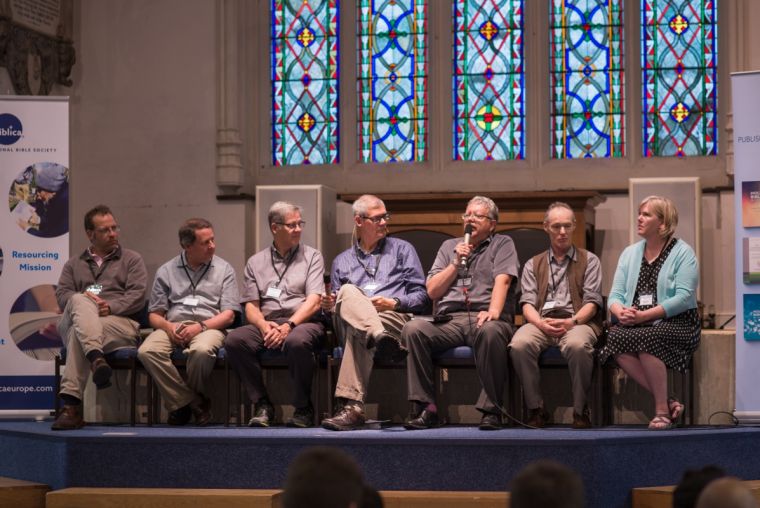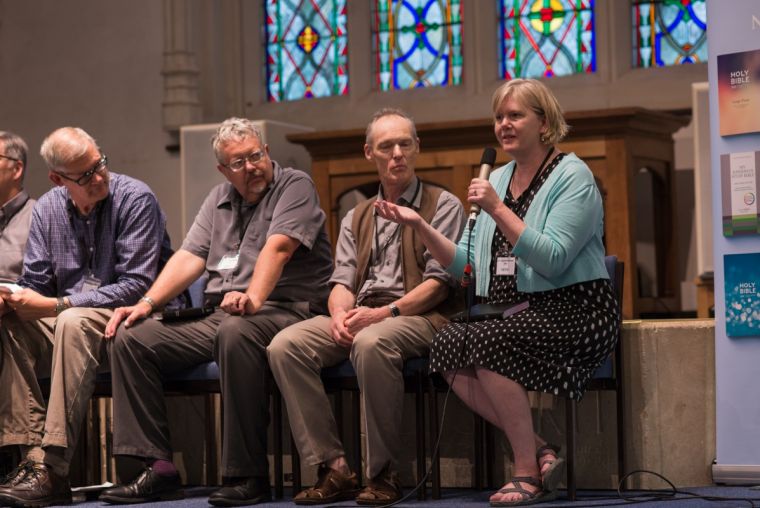More beer, less booty: The perilous pressures of Bible translation
Translating the Bible isn't easy. Just ask the team of scholars behind the New International Version (NIV) of the Bible, the most widely read contemporary English translation of Scripture.
The team behind the NIV are known as the Committee on Bible Translation (CBT) – and a selection of that team gathered in Cambridge this week to discuss the challenge of translating the word of God, in an event co-hosted by Biblica, the International Bible Society, and the British NIV publishers Hodder & Stoughton.

Contemporary Christians can be so familiar with an English Bible that they forget its complex roots in ancient Hebrew and Greek. The CBT not only have to master those tricky tongues, but also understand the history, sociology and theology of biblical times – and then forge all that understanding into an English text that is accurate and readable: 'true to God's word and true to the reader'.
The art of translation
When you're trying to decipher the word of God, the pressure is on. But translation is an art. For example, should Scripture should be translated 'word for word', in such a way as to give the simplest, most literal English version of the Hebrew/Greek used in the text? Such an approach is typical of the English Standard Version (ESV) of the Bible.
Another way is that of 'dynamic equivalence' – conveying the essential meaning of what was meant in the original text, if not using the exact same syntax or phrases. The NIV leans toward the latter approach, though its translators certainly want to stay faithful to both the word and the reader.
But the tension between the past and the present is a pervasive one: 'slavery' doesn't mean now what it did then, nor 'adoption', and 'alien' took on new meaning after sci-fi movies in the 1980s – now rendered as 'foreigner'. As committee chair Douglas Moo explained, the Bible often assumes a very different culture to ours: 'Do you try to bring readers back into that culture, or try to bring culture to the readers?'
The committee pores over the thousands of verses within Scripture, determining whether its latest translations need updating according to new research, shifts in English language or concerns for clarity. An update or change to the text is no small thing, and requires 70 per cent of the committee members to vote in favour of the change.
Some might be surprised that the words they read in their English Bibles ultimately come down to a committee vote. Rev Dr David Instone-Brewer praised the collaborative nature of the panel: 'When I joined this committee, I was converted to committees, I'd never seen one work like this one.

'Everyone is wanting to get to the text and what it says and how to express it in English, and sometimes you'll see everyone's come with their own idea of how to solve this particular problem, and no one's got it right and everyone knows no one's got it right. As we work together...there's suddenly an "aha" moment and you say "Yes, that's what God would say if he was speaking English!'"
The NIV's first edition was published in 1984, but that had been worked on since 1965. The next major update came in 2005, when the separate Today's New International Version (TNIV) was released. The latest revision of the NIV came in 2011, building on both its predecessors. Changes continue to be made, but they won't be effected until the next edition, and no one know when that will be. So what has changed?
A living language
In one potentially seismic shift, 'there's going to be a lot more beer' in the Bible. Many of the occasions of 'strong drink' will now be rendered as 'beer', since historical study shows that the ancient Middle East did in fact have its own kind of beer. It was probably an acquired taste: old bread was soaked in the River Nile, left to go mouldy, some grapes were added, and the thick result was drunk through a straw.
While beer is on the up, there will be no more 'booty'. The word once meant stolen treasure, but conventionally refers to someone's bottom.
'I remember that afternoon when we had to take "booty" out of the Bible, and no one would tell me why,' said Instone-Brewer. Another panellist chimed in amidst the laughter: 'The verse said the group were going to go somewhere because there was "much booty".'
Other changes carry more theological weight. Paul says in Philippians 2 that Christ did not consider equality with God 'something to be grasped', but does that mean Jesus had it already, or didn't have it but could 'reach' for it? The CBT settled this after research on the Greek idiom used showed it to mean 'take advantage of'. Their 2011 edition switched 'to be grasped' for 'something to be used for his advantage' – meaning Christ already had equality with God.

Another major change is the use of gender-inclusive pronouns. While the English uses of 'man' and 'he' were once used to described generic humanity, it is no longer the case. Where Scripture writes 'man' or 'he', but the translators deem it to refer to all humankind, they've translated it so with 'person' or 'someone' instead. The Greek adelphoi ('brothers') is now taken as 'brothers and sisters', and 'person' or 'human being' is often used instead of an exclusive male pronoun.
Dr Jeannine Brown quoted the Italian phrase 'traduttore, traditore': 'the translator is a traitor.' When you interpret and transfer the language of a text, something is always lost. And with Scripture, the pressures are fiercer. 'You can't win', she says, especially with warring theological factions to satisfy. Nonetheless, she says, knowing they can't get it 'right', they press on 'because it's so important'.
Are these translators inspired? Do they see God's Spirit working through them as they work to make clear his words?
They're all keen to avoid putting themselves alongside Scripture's divinely inspired writers. Moo jokes that his teacher once told him that while the biblical authors were inspired, 'we are perspired'. Dr Simon Gathercole makes the distinction between inspiration and 'illumination': the ancient authors did the former, they do the latter.
Instone-Brewer says he sees God at work not through them as individuals, but as a collective committee, despite their 'prejudices and stupidities'. Hence, they always begin with prayer, 'because we need God's help'.
Seeing the weighty work the CBT do helps one understand why we have the phrase: 'It's all Greek to me.' But of course thanks to their work, for the millions reading Scripture across the world – it isn't.
You can follow @JosephHartropp on Twitter











